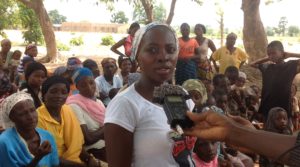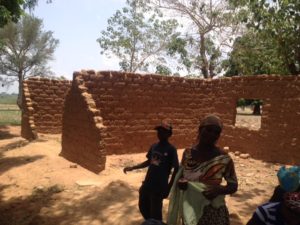By Mohammad Ibrahim and Iliya Kure

Kaduna (Nigeria) — It is the rainy season, which makes access more difficult into and out of the village, even to motorcycles. During the season, residents here usually get cut off for a minimum of two months from Kaduna city – the only road is flooded by the rain water.
“Our town usually get cut off for about two months from other towns and villages around this area,” says 70 year old Village Head, Aliyu Bala.
Welcome to Unguwan Maikanti, a village located West of Rigasa in Igabi Local government Area of Kaduna State, northwest nigeria. It is a community of about 3000 inhabitants, mostly peasant farmers. The inhabitants are predominantly Gbagyi by tribe and according to them, the village has been in existence for centuries.
The Unguwan Maikanti village which is only 25 minutes ride on motorcycle from Kaduna metropolis, is surrounded by four other sister villages including Unguwar Daudu, Kwati and Rigar Fulani, all in Igabi Local Government Area.
“We have been here for centuries because my parents and forefathers spent their lives here. We have no social amenities in these communities. No road, no water, no hospital, even the school here was built with mud by our people without government support.
“We are farmers but we cannot transport out farm produce to nearby markets because of bad road. The water we drink here is so bad that it causes sickness to our people,” the village head said.
Once upon a time, in Unguwan Maikanti, 30 year old Asabe (not her real name), a housewife, was in labour – everyone in the family was happy and eagerly awaiting the arrival of Asabe’s second child – women in the village also gathered around her to render support in the process.
The labour prolonged and Asabe could not deliver the baby – she could not be taken to any hospital or primary health care, because there was none in the area. No access to skilled attendance.
In the community, nobody owns a car – but someone had a motorcycle.
Their biggest challenge was that only a lorry uses the road linking the village to a nearby Rigasa community, where a primary health care centre is located. But at that time of the day, there was no lorry.
When the women realised Asabe’s life was in danger, they asked Asabe’s husband to rush her to a hospital in Kaduna through an alternative route, which could take about an hour.
The terrain was difficult – before Asabe’s husband got far from the village, his wife gave up.
Two weeks later, another mother of four, Lami (also not her real name) from same community lost a child due to complications during childbirth delivery.
None of the women in the village attends ante-natal, or visit the hospital for a check up during pregnancy.


The women leader, Elizabeth Jacob said they lost scores of women who die in pregnancy and childbirth delivery process.
She said the women have to be strong to deliver by themselves, or else, it is a different story.
“We lost scores of women during pregnancy and child birth, because we don’t have any place to take them for medical care if the pregnancy came with complications.
“Our women give birth at home without support from any birth attendant. We only give them herbs to drink,” she said.
AFRICA PRIME NEWS discovered that water is a scarce commodity in the village as women trek a distance to fetch water from the only pond serving the community.
A housewife, Talatu Iliya seen fetching from the pond in company of other women said “The water smells and it’s covered by dried leaves, but that is what we use to cook, because we have no choice,” she said
The women lamented that their children complain of frequent stomach ache and also suffer from cholera.
“You can see the kind of water we drink. Even dogs wouldn’t drink from the pond. The water smells and that is what we use to cook our food,” she said.

The only surviving well in the village, dug by a white lady [all the others have sunk down due to nature of the soil and because they have no rings], hardly dish out more than a bucket of water to whoever is fetching – the water is only fetched very early in the morning. Hence the decision to reserve the well water to primary school children who attend the community primary school.
The residents appealed to government to come to their aid by constructing a bore-hole that will provide water to communities in the area.
AFRICA PRIME NEWS learnt that 80 percent of the youth in the community have not gone beyond primary school education.
“Our youth have not gone beyond primary school which is why they end up unemployed. Some of them joined their parents in farming, but during dry season they become idle, doing nothing,” says Youth Leader, Jacob Maiunguwa.
Chairman of School Based Management Committee (SBMC) Peter Alkali said the only school in the village has not received any learning material from both local and state governments since it was built by the community in 1997.
“The School lacks chairs and other teaching materials the pupils miss classes during rainy season, because the only route linking the community with others get flooded and so it’s not safe for them to attend classes,” he said.


Kaduna State Government says it is working towards revamping its dilapidated health facilities scattered in villages all across the state. It also said it is working towards standardising at least a primary health care centre in each of its 225 political wards.
The state has introduced a law establishing the Primary Healthcare Under One Roof, a system that brings all the components of primary healthcare under one Management. This is meant to ease bottlenecks, as against what currently obtains, where the components are scattered in four different ministries.
Last year, the state government introduced mini ambulances meant for rural communities, like Unguwan Maikanti. It is hoped that the government and elected representatives would look into the plight of Unguwan Maikanti village and address their issues.